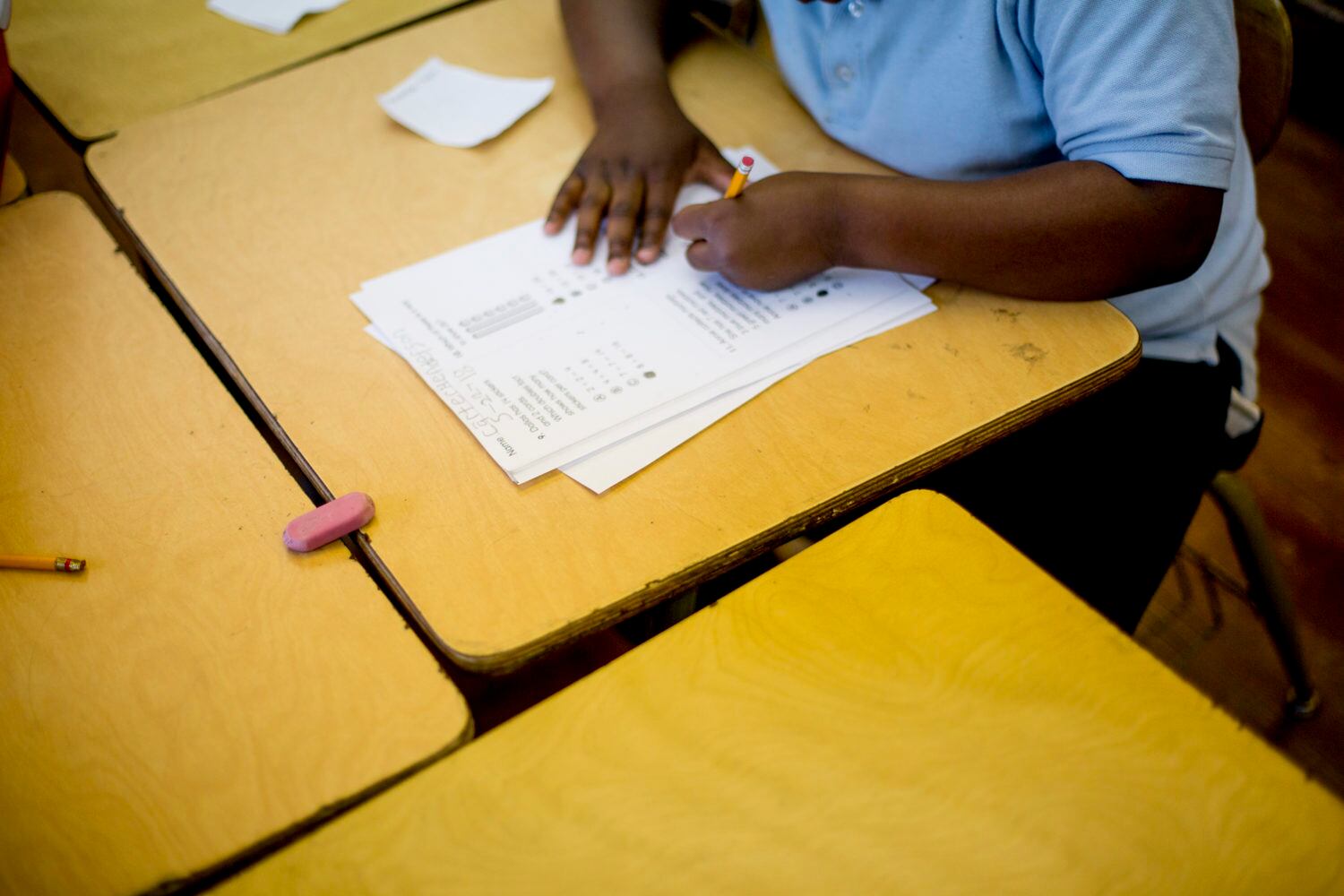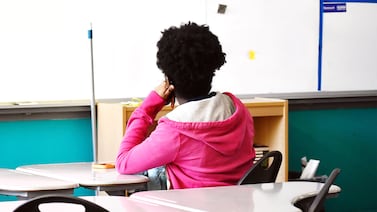Sign up for Chalkbeat Detroit’s free daily newsletter to keep up with the city’s public school system and Michigan education policy.
Students in Detroit’s school district showed improvement across a range of subjects on Michigan’s standardized tests, though they remain far behind statewide numbers.
Results of the 2024 Michigan Student Test of Educational Progress, known as M-STEP, showed that 16% of students in Detroit Public Schools Community District tested proficient in English language arts — a nearly 1.5 percentage point increase from last year. Statewide, 40.5% were proficient.
Students showed similar progress in math, with 10.5% testing proficient, compared with 9% last year.
While the results show progress and recovery after the pandemic, there were some declines among younger learners. Third and fourth graders, whose early school years were disrupted by closures due to COVID, showed a slight decrease in reading and writing proficiency.
Just 11.7% of third grade students tested proficient, down from 12.4% last year. Among fourth graders, 13.7% tested proficient this year, down from 14.8% last year.
Broken down by grade, the biggest gains came among fifth, sixth and seventh graders.
In seventh grade, for example, 15.6% of students were proficient in English language arts, a 1.5-point improvement from the previous year. Seventh grade students improved by 3 percentage points in math, from 7.9% last year to 10.9% this year.
“We are not surprised by the reports of improved results today,” Superintendent Nikolai Vitti said in a statement. “Our district and school leaders, teamed with our teachers and support staff, are embracing a performance culture with the rebuilding of our school district.”
Jeremy Singer, assistant research professor at Wayne State University and associate director of the Detroit Partnership for Education Equity and Research, said there are some positives in the historical comparisons.
“Detroit, especially the district, has had a pretty strong recovery from the pandemic relative to other places,” he said. “That’s not to say that the work of catching students up is done, but when you look at these different cohorts, they’ve done a pretty good job of getting back to at least where they were kind of at a baseline.”
Long road ahead for improvements in literacy
Some of the Detroit scores mirror statewide results that indicate Michigan’s third and fourth graders are struggling to make progress in reading and writing. Statewide, 39.6% of third graders tested proficient, a decrease from 40.9% last year.
DPSCD board member Sherry Gay-Dagnogo said the district faces a long road ahead to improve literacy rates. She said that work requires additional engagement beyond the school day, with more parents taking an active role in their children’s literacy.
“We are in our third year post the most challenging academic year due to COVID, and the data shows students haven’t shown major improvement in reading,” Gay-Dagnogo said.
Engaging with students is important, too, said Imani Foster, of 482 Forward, a local nonprofit focused on educational equity.
“Students will tell you what’s working and what is not working,” she said. “And so, we always advocate to listen to the students.”
Tara Kilbride, interim associate director of the Education Policy Initiative Collaborative at Michigan State University, said the pandemic accelerated some of the declines among young students, but that this trend “was a problem that started a long time ago.”
Educational advocates point to the state’s history of disinvestment in education as one reason for that ongoing decline.
In recent years, lawmakers have enacted more progressive education policies after Democrats took over the statehouse and the governor’s office following more than a decade of conservative control. Legislators are now placing a stronger emphasis on supporting educators.
For example, last year, lawmakers enacted a funding formula that allocates more money to districts serving the highest numbers of vulnerable students.
But advocates like Jennifer Mrozowski, of Education Trust-Midwest, say that after a legacy of disinvestment, lawmakers must allocate billions more to that formula in the coming years to make a meaningful dent. The M-STEP results, she said, accentuate that need.
“We applaud the governor and our state legislature for improving funding for students from low-income backgrounds, multilingual learners and students with disabilities, but the results are clear that Michigan’s students and their educators need more support,” she said in a statement.
Rethinking Detroit students’ M-STEP scores
Detroit students have long trailed statewide averages on standardized tests because of deep inequities, such as systemic racism and the complex web of challenges that stem from poverty. Nearly 80% of DPSCD students qualify for subsidized meals today.
Common hurdles that Detroit families struggle with, like unreliable transportation and unstable housing, have cascading effects. They contribute to community-wide challenges like chronic absenteeism, which means a student is missing at least 10% of school days.
Such frequent absences make it harder for kids to succeed in the classroom. In Detroit, 66% of kids were chronically absent during the 2022-23 school year — a 10 percentage point improvement from the previous year, but more than double the statewide rate.
Kilbride said these systemic factors tell us that a 1 or 1.5 percentage point increase in M-STEP proficiency rates — as seen in many of this year’s DPSCD test results — represents greater progress for students in Detroit than it would for kids in other districts, where more students are already proficient.
She is optimistic about some of the state’s recent education investments in areas such as educator staffing. She said having more diverse professionals with specialized training is “huge for students and being able to address student needs.”
She sees some of the initiatives that DPSCD has invested in through money from the $94.4 million literacy lawsuit as an important step on that path, especially the hiring of academic interventionists and paraprofessionals who can provide individualized support to students.
The district recently used some of the literacy lawsuit money to hire an additional 150 academic interventionists to work with K-2 students.
Vitti said this will help to narrow the literacy skills gap among young learners — one that Detroit educators are seeing with incoming kindergarteners.
“We have not had this type of support for students or teachers previously at these grade levels,” Vitti said. “This will allow for more one on one and small group literacy intervention on foundational skills.”
Robyn Vincent is a reporter for Chalkbeat Detroit, covering Detroit schools and Michigan education policy. You can reach her at rvincent@chalkbeat.org
Micah Walker is a reporter covering arts and culture and education for BridgeDetroit. You can reach her at mwalker@bridgedetroit.com
The story has been updated with the statewide number for ELA proficiency and additional reporting.






